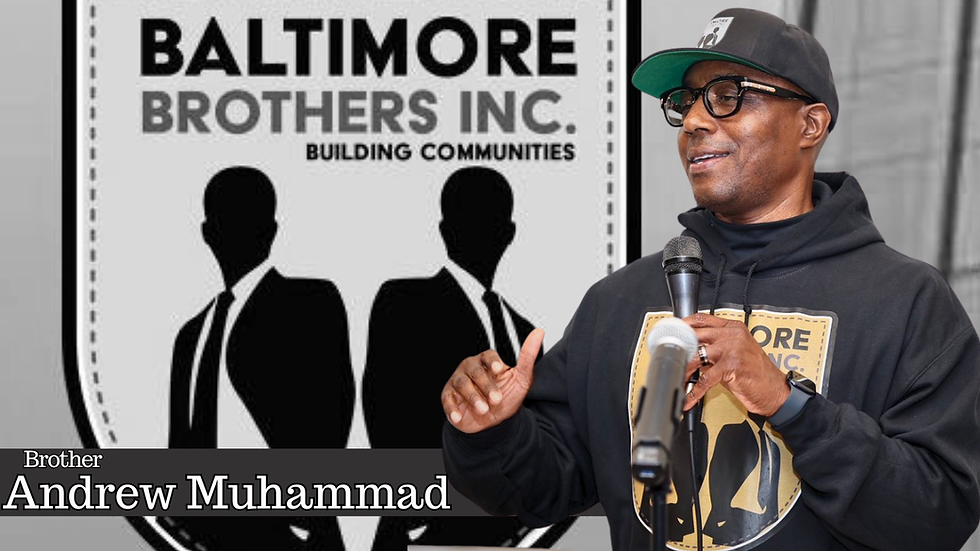“A Culture of Violence: It’s Time to Talk About It At Home, in Schools, and in Our Communities”
- Brother Levon X

- Apr 8
- 4 min read

A tragic event happened recently in Texas—a young man stabbed another during a track meet. Two families forever changed. Two lives—both so young, barely getting started. Our prayers go out to both families, but we must go beyond prayers and begin a much-needed conversation. Not just in Black households. Not just in poor neighborhoods. But in every home, school, and community across America.
Because violence is not just a “them” problem—it’s all of ours.
We Are All Affected
We live in a world where violence shows up at every level—from street corners to corporate towers, from homes to battlefields. And while we might not see missiles and drone strikes in our backyards like the children of Gaza and other war zones do, we can't ignore how often we hear about gunfire down the block, a fight at school, or a stabbing at a sporting event. These aren’t isolated events—they're part of a culture we’ve allowed to grow. Violence is no longer shocking. And that’s the real danger.
When Entertainment Becomes Education
Let’s be honest: our children are being raised in a world that glorifies violence. It’s in the music. It’s in the movies. It’s in the video games. What was once “just a movie” is now more graphic than real life. What was once “just a song” now drills messages into the mind that taking a life is something to boast about.
If children are fed images of death and killing daily, what outcome do we really expect?
Research shows that repeated exposure to violence in media can desensitize young people to aggression, making them more likely to accept violence as a normal way to handle conflict (American Academy of Pediatrics, 2016).
We Can't Just Blame Parents—But Parents Matter
Good parents can still have children who go down the wrong path. Peer pressure is real. Influence from other households is real. Some homes may be strict about what their children watch or listen to—but their kids might still visit places where those boundaries don’t exist.
This is why we need stronger community standards—not just individual rules. What’s okay in one home shouldn’t undo the discipline of another. And parents have every right to check their child's backpack, bedroom, or phone if it could prevent harm. That’s not invasion—it’s protection.
The School and Parent Relationship Must Be Stronger
Teachers see our children from a different angle than we do. And sometimes, they see warning signs that parents miss. If your child is acting out in class, showing signs of anger or isolation, that’s not just “school behavior.” That’s a cry for help.
Schools need to welcome parental involvement, and parents need to show up. If we don’t talk regularly to the adults educating our kids, we lose a key partner in their development.
It’s Time to Boycott Violence
We boycott products. We boycott companies. But how often do we boycott content?
If music, games, or movies promote violence without responsibility, we need to say, “Not in my home.” There is a difference between defending yourself and glorifying a culture of destruction. Too many forms of entertainment today blur that line.
What Can We Do?
We need to make conversations about violence normal—at the dinner table, in town halls, in classrooms, in churches, and at community meetings. Here are some steps we can take today:
Talk to your children regularly. Ask them what they’re watching, listening to, and how they feel about the violence in the world.
Strengthen relationships between parents, teachers, and community leaders.
Be mindful of what we allow in our homes—especially through media.
Support positive content—books, shows, and music that promote love, strength, and critical thinking.
Create safe spaces where youth can express their emotions and get guidance—not judgment.
Our Children Are Watching Us
As adults, we can’t say one thing and do another. If we consume violent content for entertainment, it sends a message. If we lose control in arguments or promote aggression in how we handle things, it teaches something too. We are their first teachers. And even when we think they’re not listening—they are. Always.
This Is a Universal Issue
Violence doesn’t care about race, religion, or background. But peace doesn’t either. If we truly want change, we must start by building a better culture inside our homes. And from there, let that love and awareness spread out—into the neighborhood, the classroom, and beyond. It’s going to take all of us. It’s going to take real care.
Let’s not wait for the next tragedy to start these conversations. Let’s start today.
Citations:
American Academy of Pediatrics. (2016). Media Violence. Retrieved from https://pediatrics.aappublications.org
Common Sense Media. (2023). The Effects of Media Violence on Youth. Retrieved from https://www.commonsensemedia.org
If you found this blog helpful, please share it with your network, your school, or your local parent group. Let's build a generation that sees life as sacred—and teaches that value to the next.





Comments